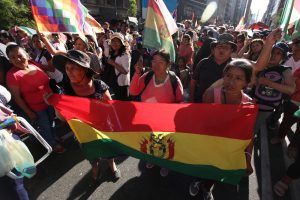
In 1639 Gabriel Naudé, a disciple of Machiavelli, defined a coup as those “uncommon situations in which the Prince against the established law and without recurring to any notion of order and justice seizes power.” Naudé’s definition — essential to determining what counts as a coup — is relevant to the recent events in Bolivia. On this view, coups are sudden events that change overnight both the legal and political orders. That is what the Chilean coup of 1973 and the Greek coup of 1967 were. Moreover, coups involve external actors exercising coercion upon the existing institutional arrangements.
In his recent article “Coup, Revolution or Negotiated Regime Change: The Case of Bolivia,” Andrew Arato responds positively to the latest political developments in La Paz. In disagreement with his Latin American students, he expresses the following caution: “I hesitate to concede the point [there was a coup] to begin with, because President Evo Morales’s previous extra-constitutional manipulation of a most important legal issue under presidential governments, term limits, prepared his own downfall.” Arato argues that the key factor in evaluating the sequence of events is Morales’ break with the presidential term-limits system. Despite his point’s relevance, I don’t believe that it is strong enough to help adjudicate the nature of events in Bolivia as a coup or non-coup.
In their recent books, both David Runciman and Steven Levitsky and Daniel Ziblatt analyzed coups along those constitution-breaking lines and distinguished them from what they call “processes of democratic degradation” from within. In my view, we should also understand Bolivia’s crisis as a process of degradation from within, one that involves the rejection of the referendum results that led to a coup. Several factors allow us to define a coup: the forced removal of the president by external forces, the break with rules of succession due to pressure on presidents of both Houses from mobs and the military, and a Senator’s seizure of power in an unconstitutional process. Hence, I contend that there is a coup.
But Arato advances a different analysis than the one I propose by differentiating between a coup and a revolution:
“…before deciding the question in the Bolivian case, we need to try to understand what a coup is and whether it is fundamentally different from a revolution. Interestingly, the older positivist legal theory defining revolution as the replacement of a government according to a process outside the legal rules of change was not able to make the distinction. We can improve on such a definition by replacing a government by the regime, and stressing regime change as well as the rupture of political legitimacy in the case of revolutions, but not necessarily coups that could be reduced to mere governmental replacement.”
I see a few relevant points here. First, Latin America does not have a revolutionary tradition except for the Mexican case. I would argue that even the Cuban case was an armed takeover of power. Instead, it’s a coup tradition with the participation of the military as a form of external coercion over the democratic system. Here, we can make use of Norberto Bobbio’s remarks that a revolution is the substitution of form by substance in the organization of political power.
Bolivia does not need a new element in the organization of political power. Its 2009 Constitution is a significant move forward in the binding of a plurinational state. It needs to go back to this existing form of organization of political power by all relevant political forces. I think the concept of revolution does not aid in understanding this case because a break in the Bolivian legal order is not necessary nor desirable. Therefore, the issue in Bolivia is how to make political actors consider the form of government the most critical issue, and then to move in the direction of restoring the previous order with the least political and legal harm possible.
In this regard, I agree with Arato that “the fact that after initial boycotts of the legislature, the party of the ex-president, the MAS (Movement for Socialism) has agreed to and voted for an electoral scenario, without Morales as a candidate, indicates the positive direction the situation can evolve.” I believe that a negotiated transition is the desired direction to restore the previous political and legal order. That requires restoring the 2009 Constitution and the mandate of the presidents of both Houses (who resigned under the threat of mobs and the military), and the handling of free and fair elections in which Morales should not be allowed to run (this is the 2009 constitution role that he broke), and finally, the establishment of a transitional government with minimal legitimacy. President Jeanine Anez is a member of a party with insignificant political representation that engaged in a non-elected political discourse against the indigenous and other parts of society. She needs to make room for a transition among the representative political forces.
A negotiated transition is the best outcome for Bolivia. It is the only process that can reestablish a legitimate political order against the usurpation of power currently taking place.
Leonardo Avritzer is an associate professor at the Federal University of Minas Gerais.

Democratic Degradation and the Bolivian Coup